| By Rex Wockner

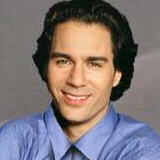 "Gay is just so not an issue. The two gay characters are having
so much fun, it's not a controversy. These guys are gay, they're
comfortable with that, they're not embarrassed or ashamed.
They're just healthy, out gay men. ... I want to get to the point
where everyone so wants Will to be happy that his first kiss
won't be a kiss just to make controversy." "Gay is just so not an issue. The two gay characters are having
so much fun, it's not a controversy. These guys are gay, they're
comfortable with that, they're not embarrassed or ashamed.
They're just healthy, out gay men. ... I want to get to the point
where everyone so wants Will to be happy that his first kiss
won't be a kiss just to make controversy."
--Eric McCormack, Will on the new NBC-TV series Will & Grace, to
the Washington Blade, Sept. 11.
<><><2><><>
"We're certainly not taking a political stance -- the gay issue
in our show is a non-issue. We're trying to show America that gay
can be a flavor in people's lives the same way as anything else.
In our show Will and Jack have been out for 15 years; we can
allow it to be who they are without it being who they are every
single day."
--Eric McCormack, Will of TV's Will & Grace, to the New York
Post, Sept. 28.
<><><3><><>
"People thought I was gay in the 2nd grade. I think a lot of guys
I went to school with are now going to be saying, 'You see,
honey, I told you he was gay!'"
--Eric McCormack, Will of TV's Will & Grace, to the New York
Post, Sept. 28. Will is gay.
<><><4><><>
"Straight people say, 'C'mon, you know you're just gay,' and gay
people say, 'C'mon, you know you're just gay,' and everybody just
wants to make me gay! There is such a thing as bisexual. People
want black and white. And I enjoy being bisexual. I enjoy being
with men and I enjoy being with women."
--Newsradio star Andy Dick to Salon magazine, Sept. 22.
<><><5><><>
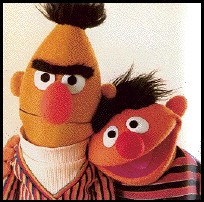 "They're puppets. They don't exist below the waist!" "They're puppets. They don't exist below the waist!"
--Steven Whitmire, the voice and puppeteer for Sesame Street's
Ernie and Kermit, on the rumors that Bert & Ernie are lovers, to
students at Pittsburgh's Carnegie Mellon University, Sept. 10.
<><><6><><>
"All that stuff about me and Bert? It's not true. We're both very
happy, but we're not gay."
--Sesame Street puppet Ernie in an appearance before students at
Pittsburgh's Carnegie Mellon University, Sept. 10.
<><><7><><>
"Baltimore now has more edge than New York. I'm so happy I'm not
20 any more. If I wanted to stay out all night, where would I go?
I have to go to my memory. The places I went, the outrageous
experiences ... sipping a cocktail while your best friend got
fucked in the corner [or] seeing Angela Lansbury at Hellfire.
That's over. I've never seen anybody famous at Blow Buddies or
the 82 Club. Next, it'll be prohibition. It will become illegal
for kids to skateboard off loading docks."
--Gay filmmaker John Waters to Denver's Out Front, Sept. 9.
<><><8><><>
"The gay movement was pretty square in the '60s, until drugs.
Drugs made gay men much hipper. I used to go to the riots because
all the boys with the bombs were so cute. I was against the war
in Vietnam, but I was more interested in the parties. I remember
the first gay liberation speech I ever heard. It was at Yale.
We'd crossed state lines, to riot basically. None of us had jobs,
the whole thing. It was to free Huey Newton. There were big
riots, fires, tear gas -- a wonderful weekend. This guy got up
and gave a gay liberation speech and everyone, Abbie Hoffman, was
horrified. They weren't against it, but the Black Panthers were
taken by surprise. It was a new thing, off the coattails of
women's liberation, which was also a new thing to them. These
women were getting sick of cooking for all those radicals while
they were out throwing bombs."
--Gay filmmaker John Waters to Salon magazine, Sept. 24.
<><><9><><>
"I'm happier in my life at 52 years old. At 25, when I made Pink
Flamingos, I was more insane, angrier maybe, but still happy.
It's 1990 now, not the '60s, when there was a cultural war going
on. Now I'm rooting for the president to get blow jobs! It's very
different. [My new film] Pecker has some of the edge of my
earlier movies but a sweeter spirit. The sense of humor is the
same. Pecker is a feel-good movie for lunatics."
--Gay filmmaker John Waters to Salon magazine, Sept. 24.
<><><10><><>
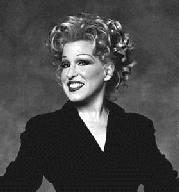 "I was in my house down in Orange County. I was all by myself and
I was nervous because I don't like to be alone. It's kind of
scary. Somebody knocked on my door and it was a fan. He started
shrieking, 'Bathhouse Betty! Bathhouse Betty!' and I thought, 'Oh
my God! How mortifying.' It was pretty scary, but I said, 'I'm
going to call the cops!' and he ran away. But he left me with
Bathhouse Betty, and how could I forget that? He was giving me an
homage to my days playing the [gay] bathhouses." "I was in my house down in Orange County. I was all by myself and
I was nervous because I don't like to be alone. It's kind of
scary. Somebody knocked on my door and it was a fan. He started
shrieking, 'Bathhouse Betty! Bathhouse Betty!' and I thought, 'Oh
my God! How mortifying.' It was pretty scary, but I said, 'I'm
going to call the cops!' and he ran away. But he left me with
Bathhouse Betty, and how could I forget that? He was giving me an
homage to my days playing the [gay] bathhouses."
--Bette Midler on how she chose the name for her new album, to
Billboard, Sept. 24.
<><><11><><>
"She's fine [work-wise]. She will not have to go sell clothes at
the Gap."
--Betty DeGeneres on her daughter Ellen to the San Francisco
Chronicle, Sept. 28.
<><><12><><>
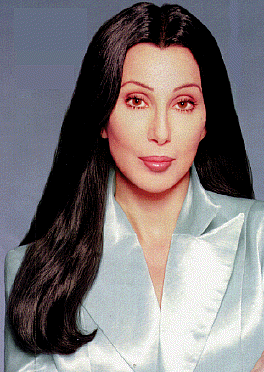 "I went ballistic. ... Down, dirty, holding my breath till I
turned blue, screaming and yelling, firing everybody --
relatives, people who worked for me -- I just went around the
house screaming and yelling. There's a difference between always
feeling [your child is gay] and then having it be, this is the
deal -- having the internal feelings but then having it be, yes,
this is the way it is. Also ... everybody in the universe seemed
to know [already] except me. So it was a combination of it being
the real thing, everyone knowing but me, and then feeling really
bad because Chaz couldn't come to me and say it." "I went ballistic. ... Down, dirty, holding my breath till I
turned blue, screaming and yelling, firing everybody --
relatives, people who worked for me -- I just went around the
house screaming and yelling. There's a difference between always
feeling [your child is gay] and then having it be, this is the
deal -- having the internal feelings but then having it be, yes,
this is the way it is. Also ... everybody in the universe seemed
to know [already] except me. So it was a combination of it being
the real thing, everyone knowing but me, and then feeling really
bad because Chaz couldn't come to me and say it."
--Cher on her daughter Chastity Bono's coming out, to Oprah,
Sept. 28.
<><><13><><>
"I wanted her to grow up, get married, have a child, get divorced
and live happily ever after."
--Cher, on her initial disappointment when her daughter Chastity
Bono came out, to Oprah, Sept. 28.
<><><14><><>
"I stand by what I said. I think that she [Ellen DeGeneres]
probably went a little too fast [with the lesbian material on her
sitcom]. It kind of got bombarding. A lot of gay people got bored
with it. And certainly straight people in Middle America thought,
'This isn't a show for me. I'm not gay.' I think the show
reflected the coming-out process, especially when you come out so
late in life. You finally realize all the injustices of the
world, and you want to do something. I think Ellen used the show
as a means of doing that. Having never been an activist before,
she didn't understand that you have to take baby steps."
--Chastity Bono to The Advocate, Oct. 13.
<><><15><><>
"Because I am in favor of same-sex marriage and monogamy, it does
not follow that I have a punitive or dismissive view of other
ways of expressing oneself sexually, or a negative view as to
civil liberties. The choice is not between crazy sexual
libertinism on the one hand and puritanism on the other. There is
a middle ground in which public institutions and culture can
encourage certain behaviors while allowing others to continue, if
that is what people want. Is that so hard to grasp? It is a
situation heterosexuals have enjoyed in this country for decades.
Why should it not be available to gay people? ... What we alleged
'neo-cons' are arguing for is simply a genuine choice."
--Gay writer Andrew Sullivan in Sept. 23 comments to this column.
<><><16><><>
"The most successful marriages, gay or straight, even if they
begin in romantic love, often become friendships. It's the ones
that become the friendships that last. Let's face it. Erotic
desire--passion--is not an enduring thing. It fizzles, or it
becomes something else. Or it transcends to something else. And
outside of romantic relationships, I think there are other
relationships that gay men have, and gay women have, and that
straight men and women have that historically have been given
short-shrift."
--Gay author Andrew Sullivan to Atlanta's Southern Voice, Sept.
10.
<><><17><><>
"I think we [gays] must stop our incessant belief that somehow,
if we haven't found the love of our life, that our lives are
somehow less meaningful. Our friendships are as deep and as
important and fulfilling in many ways as the man of our dreams."
--Gay author Andrew Sullivan to Atlanta's Southern Voice, Sept.
10.
<><><18><><>
"Whether dubbed the 'New Puritanism,' 'Sex Panic,' or simply seen
as escalating attacks on gay men's sexual cultures, events of the
past year make it clear that increased organizing and activism
are demanded. When public health concerns are used to justify
crackdowns on gay bars, sexclubs, bathhouses, and other spaces in
which men meet and have sex, and an increasingly assimilationist
gay rights movement continues to vilify gay male sex cultures,
how do we organize resistance? ... When journalists, police, and
even some gay activists target and victimize public-sex
participants, what kinds of oppositional organizing is effective?
We see our work at this summit as a way to continue the strain of
the gay liberation movement which focused on sexual freedom and
the creation of new models for gay male relationships and
communities. ... We view this summit as an example of gay
liberation work which has been exiled to the margins of [gay]
community life during the late 1990s."
--From the announcement for "Sex Panic Summit II," to be held in
Pittsburgh Nov. 13-15 in conjunction with NGLTF's Creating Change
conference.
<><><19><><>
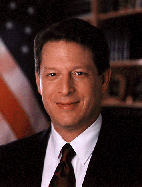 "I come before you with a simple message: that the cause we
celebrate tonight is not some narrow, special interest. It is
really the cause that has defined this nation since its founding:
to deepen the meaning of fundamental fairness, to make real the
promise of our self-government, to build a good and just society
on this bedrock principle: equal opportunity for all, special
privileges for none." "I come before you with a simple message: that the cause we
celebrate tonight is not some narrow, special interest. It is
really the cause that has defined this nation since its founding:
to deepen the meaning of fundamental fairness, to make real the
promise of our self-government, to build a good and just society
on this bedrock principle: equal opportunity for all, special
privileges for none."
--U.S. Vice President Al Gore addressing the Human Rights
Campaign annual national dinner, Sept. 19.
<><><20><><>
"It is an outrage that today, in 1998, in 40 states of our union,
it is 100 percent legal to fire a hard-working employee just
because they are gay or lesbian. That is profoundly wrong.
Everyone deserves the basic freedom from discrimination."
--U.S. Vice President Al Gore addressing the Human Rights
Campaign annual national dinner, Sept. 19.
<><><21><><>
"Our Founding Fathers spoke of the pursuit of 'life, liberty and
happiness.' And no one in our nation today should have to be
exempt from these basic rights. That means that all people,
regardless of sexual orientation, should be able to be a part of
a loving relationship and raise a family without fear of
recrimination or discrimination. It also means that all people
should be able to live their lives openly and honestly, without
fear of losing their jobs, being harassed or worse. I'm not sure
that the Founding Fathers anticipated all of the times that we
would have to test their statement of basic human rights by
writing into law the understanding that women's rights and civil
rights and gay and lesbian rights are all a part of human
rights!"
--Tipper Gore, wife of U.S. Vice President Al Gore, addressing
the Human Rights Campaign annual national dinner, Sept. 19.
<><><22><><>
"It depends on what the meaning of 'is' is."
--You know who.
|



